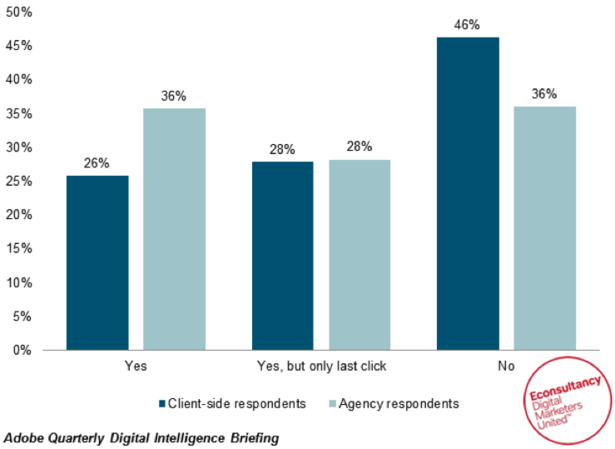 The rise of social media and mobile usage has led to an increased interest in marketing attribution, according to the latest Econsultancy/Adobe Quarterly Digital Intelligence Briefing.
The rise of social media and mobile usage has led to an increased interest in marketing attribution, according to the latest Econsultancy/Adobe Quarterly Digital Intelligence Briefing.
The new report, Making Sense of Marketing Attribution, is based on a survey of more than 700 marketers based predominantly in Europe and North America.
It finds that just under half of respondents are more focused on marketing attribution as a result of mobile and social.
More highlights follow...
Adoption of marketing attribution
Our survey finds that marketing attribution has moved past the 'early adopter' phase, and is now used in some shape or form by the majority of respondents.
28% of agency and client-side respondents are attributing sales according to the last click, while 26% of clients and 36% of agencies use a more sophisticated approach.
Do you (or your clients) typically carry out any type of marketing attribution?

Benefits of using marketing attribution
By moving away from last click models and understanding the full customer journey, marketers can optimise their spend and create the most effective media mix when planning future campaigns.
According to Econsultancy Research Director Linus Gregoriadis:
The last-click-wins approach has served the digital industry well, and is a tidy and effective way of allocating credit in a digital environment where direct response and performance have flourished using this formula.
However, in an increasingly multichannel and data-driven world, a reliance solely on last click nowrepresents a major gamble when more granular - and actionable - information is readily available.
Companies are seeing the benefits of improved attribution models, with the main plus points being 'justifying digital spending' (cited by 70% of responding companies), 'building an understanding of the customer journey' (66%) and 'optimising the media mix' (58%).
Has the marketing attribution you (or your clients) have carried out benefited your (or their) organisation?

According to one survey respondent:
Understanding the role of each media and attributing spend based on the value of each touch point [is the most significant effect of marketing attribution]. It also has an effect on bringing tracking into best practice for campaigns and reinforcing the importance of accurate tracking, robust reporting and reducing 'knee-jerk' optimisations mid campaign.
Mobile and social drive adoption
The proliferation of mobile devices, and their potential to provide a link between online and offline, makes the task of attribution more difficult.
Just under half (49%) of client-side respondents agree that mobile has increased the focus on marketing attribution, as they need to find ways to calculate the value of the channel.
Impact of mobile and social on attribution:

Social has also been instrumental in building the momentum of attribution marketing, with 58% of agency and 43% of client respondents agreeing that social media has increased focus on attribution.
With more internal resources and media spend being diverted to social platforms, marketers have turned to attribution to explain social media ROI in terms of directly and indirectly driven sales, rather than just counting the number of 'likes' or sometimes woolly analysis around 'engagement'.
Some opinions on social attribution from our respondents:
Trying to quantify the spend specifically with Facebook in terms of building relationships is still challenging, but the concept is easier to push with this data.
Social media whilst not being the most profitable channel is a definitive requirement for the customer journey and enhancement of brand advocacy.
No hay comentarios:
Publicar un comentario